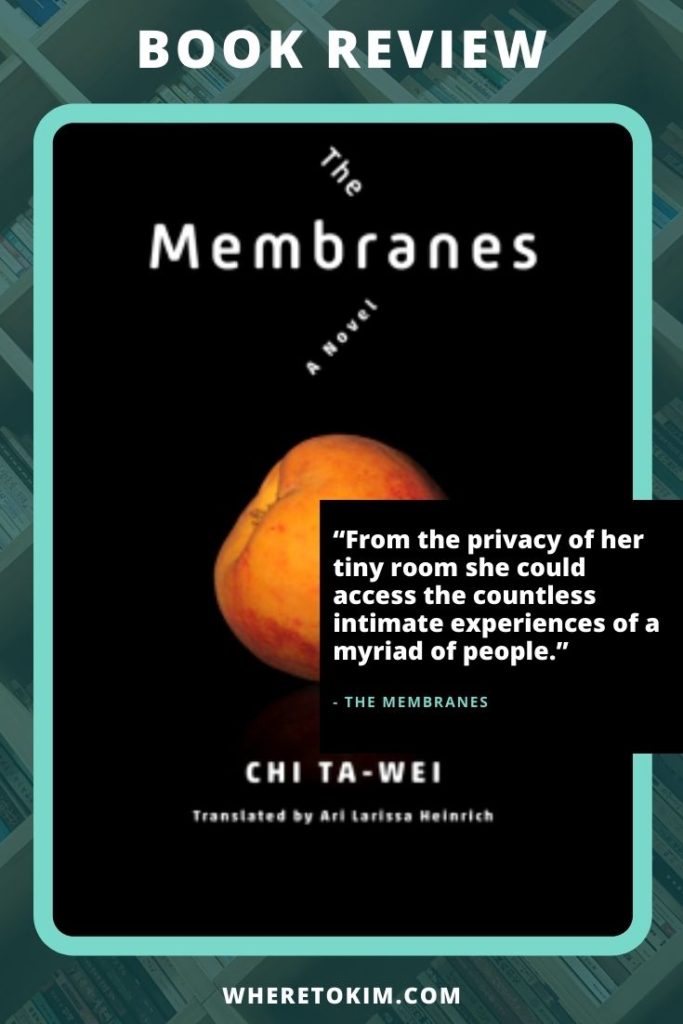The Membranes by Chi Ta-wei shows a future in which intimacy, experiences, and identity are fluid. Though in the end, the membranes still keep everything in its rightful place…
Location: set in Taiwan’s underwater city of the future
The Membranes synopsis
It is the late twenty-first century, and Momo is the most celebrated dermal care technician in all of T City. Humanity has migrated to domes at the bottom of the sea to escape devastating climate change. The world is dominated by powerful media conglomerates and runs on exploited cyborg labor. Momo prefers to keep to herself, and anyway she’s too busy for other relationships: her clients include some of the city’s best-known media personalities. But after meeting her estranged mother, she begins to explore her true identity, a journey that leads to questioning the bounds of gender, memory, self, and reality.
First published in Taiwan in 1995, The Membranes is a classic of queer speculative fiction in Chinese. Chi Ta-wei weaves dystopian tropes—heirloom animals, radiation-proof combat drones, sinister surveillance technologies—into a sensitive portrait of one young woman’s quest for self-understanding. Predicting everything from fitness tracking to social media saturation, this visionary and sublime novel stands out for its queer and trans themes. The Membranes reveals the diversity and originality of contemporary speculative fiction in Chinese, exploring gender and sexuality, technological domination, and regimes of capital, all while applying an unflinching self-reflexivity to the reader’s own role. Ari Larissa Heinrich’s translation brings Chi’s hybrid punk sensibility to all readers interested in books that test the limits of where speculative fiction can go.
Book review
Let’s talk about the many applications of membranes: for one they visibly keep the sea out of the underwater city, but they also invisibly filter one’s perspective of the world. The dermal layer that Momo applies to the skin of her clients is a tangible layer, but when this layer is scanned, the experience of the person that scans the skin is very much intangible.
It is the year 2100. Humans have moved to underwater cities to protect themselves from the power of the sun. Intermezzos explain in some detail how this happened, including the political and economical aspects of the transformation. In 1995, Chi Ta-wei predicted our failure at solving the environmental issues that we are facing. There is still reason to rejoice: apparently, humans succeeded at finding an answer to other pressing debates. In Membranes, one’s identity and gender are very fluid: it is something you can change anytime. I should mention that the author teaches about queer theory and disability at a university in Taiwan.
The main character, Momo, fights a constant battle with herself. She has a job reliant on intimacy and yet shuns intimacy in her private life. She wonders whom her body belongs to; is it to medicine, her job, herself, or a partner? When you read about the memory skin she puts on her clients’ skin and later uses as a virtual reality experience for all senses, you’ll fully understand her thoughts about these subjects. Do take some time to think about that one finger that she surgically replaces… and imagine that you are living like a canary locked inside a beautiful cage.
The narrative is quite distant without any suspense. The Membranes doesn’t focus on worldbuilding but instead focuses on the meaning of identity and the value of life. What role do memories and experiences play in this? In an interesting afterword, the translator Ari Larissa Heinrich sheds more light on the background of the story. He also mentions that the author says this book is like a cyborg body.
I’d like to add my comparison to this: although the main character Momo is named after a peach that fell from a tree, she looks more like a canary released from a bird cage. This book is literally food for thought.
The Membranes by Chi Ta-wei shows a future in which intimacy, experiences, and identity are fluid. Though in the end, the membranes still keep everything in its rightful place. I recommend this book to people who like sci-fi and dystopian novels, and to whoever appreciates stories that make you think rather than feel immersed.
Interested?
Pre-order your copy of The Membranes from Amazon (available 1 June 2021).
Book details
Title: The Membranes
Author: Chi Ta-wei
Translator: Ari Larissa Heinrich
Publisher: Columbia University Press
Pages: 160
ISBN (13): 9780231195713
Publication date: 1 June 2021
Many thanks to Columbia University Press and NetGalley for a digital ARC of this novel in exchange for an honest review.







